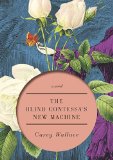Write your own review!
Rita L. (Green Bay, WI)
Light Reading
I would consider this book a light summer read. While the story was interesting enough, with the invention of a “writing machine”, I thought the characters were underdeveloped and I had no strong feelings about any of them. I enjoy historical novels when there is detail about the customs and culture of the time, but I felt this was missing here.
Celia A. (Takoma Park, MD)
I wanted it to be better
This book was a fast read, but it didn’t grab me. Carolina Fantoni, the contessa of the title, was the only character who seemed particularly fleshed out. The characters are based on historical figures, so perhaps Wallace had less to work with for the characters of Pietro (the husband) and Turri (the friend and inventor of an early typewriter). I did enjoy Wallace’s description of Carolina’s experience as she was going blind. This wasn’t a bad book, but I wanted it to be better.
 Joan V. (ny)
The Blind Contessa's New Machine
Joan V. (ny)
The Blind Contessa's New Machine
This book was an interesting read, but the ending was rushed and left a lot of questions unanswered. Some of the characters, Pietro, the husband were a bit too conventional. To me the most interesting and original character was Turri. He was the most three dimensional person in the book.
On the positive side, the descriptions of the Contessa going blind and her eventual blindness were very vivid. You could feel Carolina’s fear mounting as her blindness progressed. The scenes where she learned to travel around the house at night and find her way to the lake were interesting, but became a bit repetitious after awhile.
I definitely would like to read more by this writer.
Kim L. (cary, IL)
The Blind Contessa's New Machine
I found this book to be slow to start. I was disappointed in the ending, it left me wanting more. This was because there was no real depth to any of the characters and I felt let down when I finished the book. It was an intriguing storyline which led me to read the book but it didn't satisfy.
Kim L. (cary, IL)
The Blind Contessa's New Machine
I found this book to be slow to start. I was disappointed in the ending, it left me wanting more. This was because there was no real depth to any of the characters and I felt let down when I finished the book. It was an intriguing storyline which led me to read the book but it didn't satisfy.
Lesley F. (San Diego, CA)
Blindsided by Blind Contessa
I loved this small-sized, quickly-read, summer-reading-prize of a book. The story is a heart-stopper. It is exciting, thrilling, a great love story, mysterious and dangerous to the end. Then what? It ends. Fast.
But I needed something to carry on with at the end - something to hold fast to as the inevitable happened. The author left me with nothing. This is, as has been noted by experts, clearly a generational difference, as apparently, young people don’t mind an incomplete ending. I understand that, but her epilogue is so abrupt, that, while one person in the story at least exhibits some closure, the other does not, at all, and that is a great pity. It gets a three only because the story is such a good one. It gets no more because of that ending.
Catherine H. (Nashua, NH)
I really wanted to like this book but....
As I read the last line, it left me with a feeling of frustration. The story was interesting enough: a blind Comtessa in the 1800s Italy, the husband, the friend and lover, who invents a "new machine" for her especially: both characters and story are not developed enough; I ended up the book wanting more. Nice book for a summer afternoon.
Minnesota book lover
love and technology
A love story about 19th century Italian aristocrats, both of whom are married to "good matches" who are wrong for them. When the woman goes blind, the man - an amateur scientist - builds a precursor of a typewriter for her so she can send him messages. Lots of lovely flowery language about details of what is seen and/or imagined, but no real depth in the characters or chemistry between them. One senses that the author wants the reader to ache wistfully for the hopeless lovers, but there isn't quite enough to draw one in to this extent.




